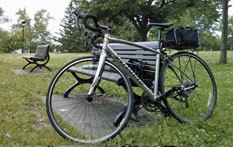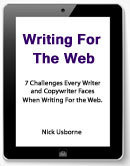Nick Usborne's Blog, page 21
July 14, 2014
On judgment, causality and copywriting.
 During the summer months, after work, I either take my kayak out on the river, or cycle for an hour along the local bike paths.
During the summer months, after work, I either take my kayak out on the river, or cycle for an hour along the local bike paths.
When I’m cycling I always stop at the same park bench for a rest at the half-way mark, exactly 10 kilometers from my home.
A couple of weeks ago a gentleman sat down on the bench next to mine and starting talking to me. He seemed to have an axe to grind about the number of Muslims living in Montreal.
To support his opinion, he told me a story about how he had seen a couple of Muslims sitting at one of the park’s few picnic tables that are specially designed and designated for people in wheelchairs. But when a man in a wheelchair approached the table, the two Muslims waved him away and carried on with their conversation.
The gentleman talking to me presented this story as evidence that Muslims were not good people and shouldn’t be welcome in our city.
Coincidentally, the very next day, two young Muslim women with headscarves sat down on the same bench next to mine. They were in their twenties, chatting away, checking their smartphones and enjoying the sun.
Then they saw an old couple with walking sticks coming down the path, glancing at the benches.
Both young women jumped up and offered the bench to the old couple.
One could conclude from this that all Muslims are thoroughly decent and kind people.
Of course, both conclusions are wrong.
All one can reasonably conclude is that the people at the picnic table were selfish and unkind, and that the two women on the bench were selfless and decent.
Their behaviour had nothing to do with either their religion or how they dressed.
So why do we jump to conclusions like this? Why are we so fast to judge people based on surface indicators like their ethnic origin, their age, their weight, how they dress, how they do their hair and so on?
There are plenty of reasons. But the one I’m interested in today is our obsession with causality.
When we see something or hear about something, we absolutely have to be able to identify a cause. We feel hugely uncomfortable in the absence of a simple, easy-to-identify and often superficial cause.
Why is our son doing poorly at school? We’ll never just say that he’s not very gifted academically…that bookwork is not his thing. Instead, we’ll find a cause. Maybe it’s the school, or the teachers, or maybe he has a learning disability.
Why is the weather so hot this summer? Again, we’ll rarely shrug and say, “Heck, the weather varies year to year. Always has and always will.” Instead we’ll find a cause, whether its global climate change or a shift in the flow of the Gulf Stream.
Why is the economy in trouble? The real answer is hugely complicated. But we don’t like complicated. We want to be able to identify a single, easy-to-explain cause.
Depending on who you talk to, the cause of our fragile economy might be the Fed, the 1%, Obama, Wall Street…and so on.
You can see this obsession with causality play out in the financial press every day. Consider these headlines on the price of gold, all published on the same day in response to the same move in gold prices.
Gold falls on profit taking, weak physical demand.
Gold falls on increased appetite for risk.
Gold falls on positive news out of Europe.
You’ll find headlines like these every day. Each journalist finds a different cause for the fall in the price of gold. The real cause is always more complicated, but the journalists know their readers want to be given one, simple cause.
By now, I hope you are putting two and two together and seeing how our obsession with causality impacts your work as a copywriter.
When you write to an audience, you need to identify a single, simple cause.
To show you what I mean, here is a headline for a weight loss ad that absolutely won’t work.
Man loses 20lbs after changing his diet, exercising 40 minutes a day, getting more sleep and taking probiotics.
This headline is far more likely to work.
Man loses 20lbs after taking probiotics.
Better still…
Man loses 20lbs after making this one simple change to his diet.
The first headline is the most “real” and honest. But it won’t sell much.
The second headline taps into our obsession with identifying a single, superficial cause for everything we see and experience.
The third headline sticks with the single cause, but adds some intrigue. You have to read beyond the headline to find the answer.
As a copywriter you are probably already aware of the “rule of one”. In other words, stick with one message, one promise and one offer. Keep it simple.
Now I want you to overlay the “rule of one” with an understanding of causality.
Your one message and one promise shouldn’t be based on a deeply understood and carefully considered appreciation of the complexity of life as it really is.
Instead, you should focus on that one, simple and usually superficial cause that your audience is most likely to respond to.
In my next post I’ll tackle part two of this story…which is how causality is linked to stories and narratives, and how you can use that link to further increase the power of your copy. Here it is...
About the author: Nick Usborne is an online writer, copywriter, author and coach. Read more…

If you found this post helpful, sign up for my e-newsletter and get a free copy of my 35-page guide...
Writing For The Web #1 -- 7 Challenges every Writer and Copywriter faces when writing for the Web.
Sign up and I'll send you the link for the download, and then you'll receive my most recent post as part of my e-newsletter every Tuesday morning.
Sign Up for my Excess Voice Newsletter...
Name:
Email:
0 subscribers
We respect your privacy
Email Marketing by GetResponse
(Your email address will be used only for the purpose of sending you this newsletter, and you'll be free to unsubscribe at any time.)
June 30, 2014
Introducing Author Platform 2.0 – A better website for your books and ebooks.
 If you’re an author, you probably have a website.
If you’re an author, you probably have a website.
And if it’s like the typical author website, it’s what I call Author Platform 1.0.
In other words, it’s old-school, with 20 pages of content or less. Or to put it another way, it’s a brochure for your books.
And if you’re not sure what I mean by the word “platform”, it’s the word publishers use when asking you if you have an audience…a large group of people you can reach out to when it comes time to sell your books.
Back when I had my first book published in 2002, by McGraw-Hill, they were very keen to ask about my platform. They wanted to know I had an audience ready and waiting for publication day.
And back then it worked fine to create a ten-page author brochure online…Author Platform 1.0.
It worked.
But it doesn’t work anymore. For two reasons.
Reason #1: Because the web is too busy and noisy.
The web in 2002 and the web today are two very different places. If you knew even a little bit about the search engines back in 2002, you stood a very good chance of getting your skinny author website in front of a lot of people.
But that isn’t true today.
Today there are billions of new pages, posts and social media updates being posted every day. The web – the social web in particular – has become a screaming, overcrowded, messy and noisy place.
Your skinny little website will be lost in the noise.
I don’t care how good you are at SEO. With a 10 or 20-page website, there is no way you’re going to get much in the way of organic search engine traffic.
To succeed today, you need a much, much bigger website that is truly social.
Reason #2: Because everyone is an author, and nobody knows you.
Again, back in 2002, being a published or soon-to-be-published author gave you a certain credibility.
Everyone knew it was hard to get past the gatekeepers. If you were signed up by a major publisher, it meant you were already one of the chosen few, and presumably worth reading.
Today anyone can self-publish a book. Anyone can be an author. And anyone who is prepared to bend the truth a little can call themselves a bestselling author.
That instant credibility is gone.
And that raises the question…why should I buy your book? I don’t know you. I have no way of knowing whether you’ll deliver the goods.
This lack of instant credibility is a problem that cannot be met with a 10-page author brochure. I have aunts and grandchildren who could sign up for an instant author website service and create a good looking site in a couple of days.
This is why every aspiring author needs to build their online presence around a very different approach – Author Platform 2.0.
With Author Platform 2.0 you give before you ask.
With Author Platform 2.0 you have a site with a lot more pages, and you are constantly writing to your fan base. Not just when you have a novel to pitch. But all the time. Week after week. Year after year.
This isn’t a new idea. Smart authors have been doing it for a long time. It’s just that most authors don’t.
As an example, if you have read the sci-fi and fantasy writing of Cory Doctorow, you have probably also read much of his non-fiction writing at his site Craphound.com, and at BoingBing.net, and elsewhere.
He is constantly giving to his readers. And when he occasionally publishes a new novel, he is never short of buyers. Of course he isn’t…because he has built an audience of people who know, trust and like him.
All fiction writers should take the same approach. Build your platform first. Build your community first. And then pitch your novels.
The same goes for non-fiction authors.
Don’t just write a book and then think, “Dangit, I guess I should create a quick website for this.”
Here is an example of what I could do myself, as a non-fiction writer.
As many people know, in addition to my web writing and copywriting work, I’m also a coffee nut. And for over 7 years now I have been writing a site about gourmet coffee, CoffeeDetective.com.
I get thousands of visitors a day coming to the site. I have a list of fans who have signed up for my newsletter.
In other words, I have an audience of people who know me, trust me and like me as an expert on coffee.
So if I decided to write a book about making gourmet coffee…I would be in a perfect position to attract a ton of early buyers.
As another example, I know someone who writes a website about raising rabbits. She’s a rabbit nut.
She knew she liked writing, but didn’t consider herself an author until her readers started asking for more detailed information. So now she sells ebooks from her site. Her audience asked for them. Now she’s an author.
Best of all, she’s an author with a built-in audience, because of her website.
The best part about the Author Platform 2.0 approach is that is also generates passive income.
Whether you write fiction or non-fiction, if you have a website with dozens and then hundreds of pages – as you add more and more content over time – that website can start earning its own way, and more.
On my coffee site I place ads and affiliate links on pretty much every page.
And since I began the site in 2007 it has earned me over $200,000 in passive income through those ads and links.
That’s more than I have ever earned with any of my books!
In other words, your author website can earn you more than your books do. It becomes a money-making website in its own right.
This is great news for authors, because it gets past the feast and famine aspect of being a writer. Your website will earn you money 365 days a year, day and night. Even when you’re on vacation…or working hard on your next book.
How to write your own money-making website, whether you are an author or a writer planning to become an author.
A few years ago, after experiencing success with my own website about coffee, I sat down and wrote a program to help other people do the same.
Since then, over 1,000 writers have used the program to create their own websites on a very diverse range of topics…from archeology, to roof-top gardening, gluten-free baking, yoga for seniors, finance and dozens of other topics.
Many of those people have then gone on to write and sell ebooks from their sites…and have become authors.
They began with an interest or passion, became practiced writers on that topic while writing their websites, and then discovered they were authors-in-waiting.
And, of course, their websites earn them passive income, just like mine does.
Although I didn’t originally have authors in mind when I developed the program, it now occurs to me that the model I created is also the perfect framework for Author Platform 2.0.
If you are interested in learning about my program, you can find out more here… How to Write Your Own Money-Making Websites.
NOTE: If you buy the program before July 3rd, you’ll save $150 on the regular price, and you’ll be in time to take part in my 7-part live training series which starts on July 8th.
About the author: Nick Usborne is an online writer, copywriter, author and coach. Read more…

If you found this post helpful, sign up for my e-newsletter and get a free copy of my 35-page guide...
Writing For The Web #1 -- 7 Challenges every Writer and Copywriter faces when writing for the Web.
Sign up and I'll send you the link for the download, and then you'll receive my most recent post as part of my e-newsletter every Tuesday morning.
Sign Up for my Excess Voice Newsletter...
Name:
Email:
0 subscribers
We respect your privacy
Email Marketing by GetResponse
(Your email address will be used only for the purpose of sending you this newsletter, and you'll be free to unsubscribe at any time.)
Nick Usborne's Blog
- Nick Usborne's profile
- 6 followers



